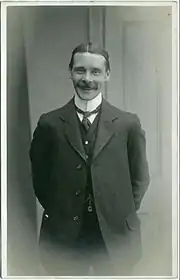
Macassar oil is an oil that was originally compounded from Macassar ebony oil that was used primarily by Western European men throughout the 1800s and early 1900s as a hair conditioner to groom and style the hair.[1]
It was popularised by Alexander Rowland (1747–1823), a celebrated London barber. It was then not uncommon for barbers to make their own hair preparations, and around 1793 Rowland began offering Rowland's Macassar Oil. Within two decades it had become hugely popular, and was aggressively advertised with extravagant claims of its effectiveness, becoming one of the first nationally advertised products.[2]
The words Macassar Oil were registered as a trademark by A. Rowland & Sons in 1888. Rowland's son (also named Alexander) later stated that a relative living in the island of Celebes in the Dutch East Indies had helped in procurement of the basic ingredient.
Although it was originally made with Macassar ebony oil (known as kayu hitam where it is still used in Indonesia), due to the difficulty of obtaining it, as a result of the decline in the availability of the tree (as the result of being overharvested for lumber), it was increasingly made with vegetable oils, such as coconut, palm or Kusum oil,[3] combined with fragrant oils such as ylang-ylang.[4]
Macassar oil was so named because it was reputed to have been manufactured from ingredients purchased in the port of Makassar in the Dutch East Indies.[5] The poet Byron facetiously called it "thine incomparable oil, Macassar" in the first canto of Don Juan,[6] and Lewis Carroll also mentions "Rowland's Macassar Oil" in the poem "Haddocks' Eyes" from Through the Looking-Glass.[7]

Due to the tendency for the oil to transfer from the user's hair to the back of his chair, the antimacassar was developed. This is a small cloth (crocheted, embroidered or mass-produced), placed over the back of a chair to protect the upholstery.[8]
See also
References
- ↑ "Men's Hair Care Lesson: How Conditioner Works". Detailsformen.com. Archived from the original on 2014-10-06. Retrieved 2014-06-22.
- ↑ Corley, T. A. B. (2008-01-03). "Oxford Dictionary of National Biography: Alexander Rowland". Oxford Dictionary of National Biography (online ed.). Oxford University Press. doi:10.1093/ref:odnb/59286. (Subscription or UK public library membership required.)
- ↑ Ghosh, P; Chakraborty, P; Mandal, A; Rasul, M G; Chakraborty, Madhumita; Saha, A (Mar–Apr 2011). "Triterpenoids from Schleichera oleosa of Darjeeling Foothills and Their Antimicrobial Activity". Indian Journal of Pharmaceutical Sciences. 73 (2): 231–233. doi:10.4103/0250-474x.91568. PMC 3267311. PMID 22303070.
- ↑ "Ylang-ylang essential oil information". Essentialoils.co.za. 2014-05-29. Retrieved 2014-06-22.
- ↑ "Macassar Oil". Abc.net.au. Retrieved 2014-06-22.
- ↑ One or more of the preceding sentences incorporates text from a publication now in the public domain: Chisholm, Hugh, ed. (1911). "Antimacassar". Encyclopædia Britannica. Vol. 2 (11th ed.). Cambridge University Press. p. 127.
- ↑ The Annotated Alice: Alice's Adventures in Wonderland & Through the Looking Glass by Lewis Carroll, Illustrated by John Tenniel by Martin Gardner (1960), New York, Bramhall House ISBN 0-517-02962-6
- ↑ Charles Dickens, Sketches by Boz 1836: Tales: Ch 4, The Tuggses at Ramsgate
External links
- Macassar Oil for the Hair, recipe from The White House Cookbook (1887)